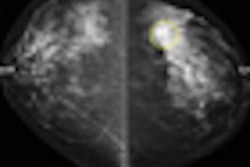
NEW YORK (Reuters Health), Oct 29 - Giving chemotherapy during radiotherapy to patients with locally advanced, nonresected head or neck carcinoma nearly doubles their average overall survival and more than doubles their event-free survival, compared to giving the treatments separately, research indicates.
In a paper published online October 28 in The Lancet Oncology, Allan Hackshaw, at University College London, and the U.K. Head and Neck Cancer Trialists' Group report on survival and recurrence among participants in the U.K. Head and Neck trial, which was conducted between 1990 and 2000.
The 713 patients who did not have surgery were all treated with radiation, either alone (n = 233); with two simultaneous (SIM) courses of non-platinum chemotherapy (n = 166); with two subsequent (SUB) courses of chemotherapy (n = 160); or with both SIM and SUB chemotherapy (four courses total; n = 154).
Chemotherapy regimens were either methotrexate alone or vincristine, bleomycin, methotrexate, and fluorouracil (VBMF). Radiation was administered according to local practice. Regimens used did not affect results.
In the intent-to-treat analysis, median event-free survival was 2.2 years in the SIM group versus 1.0 year in the other groups (p = 0.005).
At a median follow-up 10 years, the median overall survival was 4.7 years in the SIM group, 2.3 years in the SUB group, 2.7 years in the SIM plus SUB group, and 2.6 years with radiotherapy alone.
Overall survival differences were not statistically significant, which the authors attribute to fewer overall survival events compared with event free survival and a smaller effect size (hazard ratios of 0.82 vs 0.72, respectively).
"There were 12 treatment-related deaths, largely associated with dehydration, necrosis, mucositis, dysphagia, and renal failure," the authors report. Acute toxicity requiring hospitalization affected about 20% of patients.
The researchers estimate that for every 100 patients in the nonsurgical SIM group, there would be 11 fewer events (recurrence, new tumors, or death) by 10 years after starting treatment than if radiation had been given alone.
The Trialists' Group also analyzed outcomes for 253 patients who were allocated to surgery. After randomization, 135 received radiotherapy alone and 118 received radiotherapy plus SIM. In these cases, however, chemotherapy was of no benefit, and the acute toxicity rate doubled.
"In summary," the authors write, "there was a clear benefit on recurrences and deaths associated with two courses of simultaneous no-platinum chemoradiotherapy in patients who had not undergone previous surgery, and this benefit persisted after a long follow-up."
Furthermore, "improving event-free survival reduces the number of patients who later need radical salvage surgery, which can be associated with long-term or permanent disfigurement, impaired function (e.g., ability to speak or eat easily), or social exclusion."
Lancet Oncol 2009.
Last Updated: 2009-10-28 17:48:38 -0400 (Reuters Health)
Related Reading
Radiation therapy slows return of head/neck cancer, September 15, 2009
Copyright © 2009 Reuters Limited. All rights reserved. Republication or redistribution of Reuters content, including by framing or similar means, is expressly prohibited without the prior written consent of Reuters. Reuters shall not be liable for any errors or delays in the content, or for any actions taken in reliance thereon. Reuters and the Reuters sphere logo are registered trademarks and trademarks of the Reuters group of companies around the world.


















